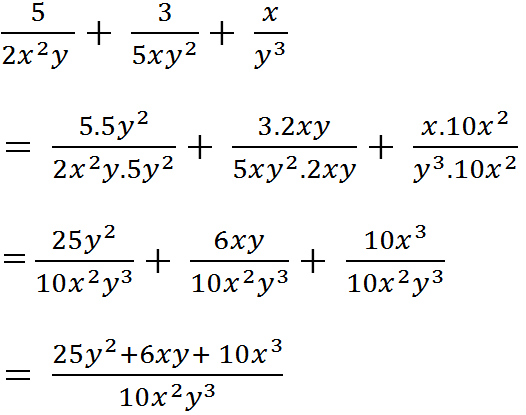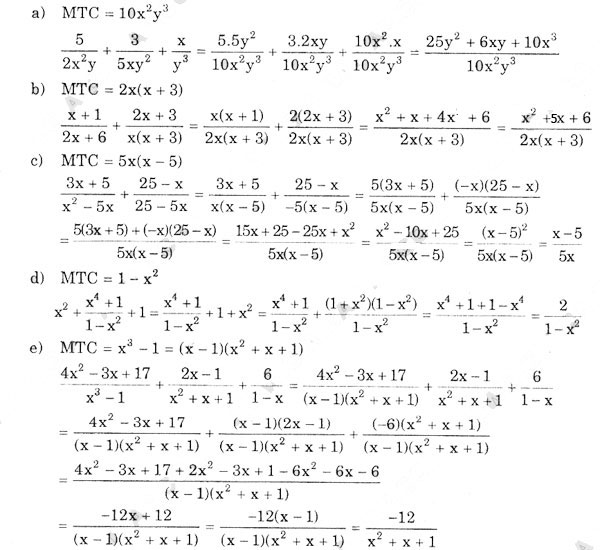Hãy nhập câu hỏi của bạn vào đây, nếu là tài khoản VIP, bạn sẽ được ưu tiên trả lời.

a: \(\Leftrightarrow-12x-4=8x-2-8-6x\)
=>-12x-4=2x-10
=>-14x=-6
hay x=3/7
b: \(\Leftrightarrow3\left(5x-3\right)-2\left(5x-1\right)=-4\)
=>15x-9-10x+2=-4
=>5x-7=-4
=>5x=3
hay x=3/5(loại)
c: \(\Leftrightarrow x^2-4+3x+3=3+x^2-x-2\)
\(\Leftrightarrow x^2+3x-1=x^2-x+1\)
=>4x=2
hay x=1/2(nhận)

\(\dfrac{x}{x-1}-\dfrac{2x}{x^2-1}=0\left(ĐKXĐ:x\ne\pm1\right)\\ \Leftrightarrow\dfrac{x\left(x+1\right)}{\left(x-1\right)\left(x+1\right)}-\dfrac{2x}{\left(x-1\right)\left(x+1\right)}=0\\ \Rightarrow x^2+x-2x=0\\ \Leftrightarrow x^2-x=0\Leftrightarrow x\left(x-1\right)=0\\ \Rightarrow\left[{}\begin{matrix}x=0\\x-1=0\Rightarrow x=1\left(loại\right)\end{matrix}\right.\)
vậy phương trình có tập nghiệm là S={0}.
b)
\(\dfrac{\left(x+2\right)^2}{2x-3}-1=\dfrac{x^2+10}{2x-3}\left(ĐKXĐ:x\ne\dfrac{3}{2}\right)\)
quy đồng và khử mẫu phương trình trên, ta được:
\(\left(x+2\right)^2+3-2x=x^2+10\\ \Leftrightarrow x^2+4x+4-2x-x^2=10-3\)
\(\Leftrightarrow2x+4=7\Leftrightarrow2x=7-4=3\Rightarrow x=\dfrac{3}{2}\left(loại\right)\)
vậy phương trình đã cho vô nghiệm.
c)\(\dfrac{x+5}{x-5}-\dfrac{x-5}{x+5}=\dfrac{20}{x^2-25}\left(ĐKXĐ:x\ne\pm5\right)\)
\(\Leftrightarrow\dfrac{\left(x+5\right)^2}{\left(x-5\right)\left(x+5\right)}-\dfrac{\left(x-5\right)^2}{\left(x+5\right)\left(x-5\right)}=\dfrac{20}{\left(x+5\right)\left(x-5\right)}\)
\(\Rightarrow\left(x+5\right)^2-\left(x-5\right)^2=20\)
\(\Leftrightarrow x^2+25x+25-x^2+25x-25=20\\ \Leftrightarrow50x=20\Rightarrow x=\dfrac{2}{5}\)
vậy tập nghiệm của phương trình là \(S=\left\{\dfrac{2}{5}\right\}\)
d)\(\dfrac{3x+2}{3x-2}-\dfrac{6}{2+3x}=\dfrac{9x^2}{9x^2-4}\left(ĐKXĐ:x\ne\pm\dfrac{2}{3}\right)\)
quy đồng và khử mẫu phương trình trên, ta được:
\(\left(3x+2\right)^2-6\left(3x-2\right)=9x^2\\ \Leftrightarrow9x^2+12x+4-18x+12-9x^2=0\\ \Leftrightarrow16-6x=0\Leftrightarrow6x=16\Rightarrow x=\dfrac{16}{6}\)
vậy tập nghiệm của phương trình là \(S=\left\{\dfrac{16}{6}\right\}\)
e)\(\dfrac{3}{5x-1}+\dfrac{2}{3-5x}=\dfrac{4}{\left(1-5x\right)\left(5x-3\right)}\left(ĐKXĐ:x\ne\dfrac{1}{5};\dfrac{3}{5}\right)\)
quy đồng và khử mẫu phương trình trên, ta được:
\(3\left(3-5x\right)+2\left(5x-1\right)=4\\ \Leftrightarrow9-15x+10x-2=4\\ \Leftrightarrow-5x=-3\Rightarrow x=\dfrac{3}{5}\left(loại\right)\)
vậy phương trình đã cho vô nghiệm.
f)
\(\dfrac{3}{1-4x}=\dfrac{2}{4x+1}-\dfrac{8+6x}{16x^2-1}\left(ĐKXĐ:x\ne\pm\dfrac{1}{4}\right)\)
quy đồng và khử mẫu phương trình trên, ta được:
\(-3\left(4x+1\right)=2\left(4x-1\right)-8-6x\\ \Leftrightarrow-12x-3=8x-2-8-6x\\ \Leftrightarrow-14x=-7\Rightarrow x=\dfrac{1}{2}\)
vậy phương trình có tập nghiệm là \(S=\left\{\dfrac{1}{2}\right\}\)
g)
\(\dfrac{y-1}{y-2}-\dfrac{5}{y+2}=\dfrac{12}{y^2-4}+1\left(ĐKXĐ:y\ne\pm2\right)\)
quy đồng và khử mẫu phương trình trên, ta được:
\(\left(y-1\right)\left(y+2\right)-5\left(y-2\right)=12+y^2-4\\ \Leftrightarrow y^2+y-2-5y+10=12+y^2-4\\ \Leftrightarrow-4y+8=8\Leftrightarrow-4y=0\Rightarrow y=0\)
vậy phương trình có tập nghiệm là S={0}
h)
\(\dfrac{x+1}{x-1}-\dfrac{x-1}{x+1}=\dfrac{4}{x^2-1}\left(ĐKXĐ:x\ne\pm1\right)\)
quy đồng và khử mẫu phương trình trên, ta được:
\(\left(x+1\right)^2-\left(x-1\right)^2=4\\ \Leftrightarrow x^2+2x+1-x^2+2x-1=4\\ \Leftrightarrow4x=4\Rightarrow x=1\)
vậy phương trình có tập nghiệm là S={1}.
i)
\(\dfrac{2x-3}{x+2}-\dfrac{x+2}{x-2}=\dfrac{2}{x^2-4}\left(ĐKXĐ:x\ne\pm2\right)\)
quy đồng và khử mẫu phương trình trên, ta được:
\(\left(2x-3\right)\left(x-2\right)-\left(x+2\right)=2\\ \Leftrightarrow2x^2-7x+6-x^2-4x-4=2\\ \Leftrightarrow x^2-11x=0\Rightarrow\left[{}\begin{matrix}x=0\\x-11=0\Rightarrow x=11\end{matrix}\right.\)
vậy phương trình có tập nghiệm là S={0;11}
j)
\(\dfrac{x-1}{x^2-4}=\dfrac{3}{2-x}\left(ĐKXĐ:x\ne\pm2\right)\)
quy đồng và khử mẫu phương trình trên, ta được:
\(x-1=-3\left(x+2\right)\Leftrightarrow x-1=-3x-6\\ \Leftrightarrow4x=5\Rightarrow x=\dfrac{5}{4}\)
vậy phương trình có tập nghiệm là \(S=\left\{\dfrac{5}{4}\right\}\)

1.
A =\(2x^2-8x+10=\left(x^2-2x+1\right)+\left(x^2-6x+9\right)\)
\(=\left(x-1\right)^2+\left(x-3\right)^2=\left(x-1\right)^2+\left(3-x\right)^2\)
Có: \(\left\{{}\begin{matrix}\left(x-1\right)^2\ge0\\\left(3-x\right)^2\ge0\end{matrix}\right.\forall x\)
<=> \(\left|x-1\right|+\left|x-3\right|\)
Áp dụng bđt |a| + |b| \(\ge\) |a + b| có:
\(\left|x-1\right|+\left|3-x\right|\ge\left|x-1+3-x\right|=2\)
đẳng thức xảy ra khi \(1\le x\le3\)
Vậy ................
1.
a)
\(A=2x^2-8x+10=2\left(x^2-4x+4\right)+2\ge=2\left(x-2\right)^2+2\ge2\)
Đẳng thức xảy ra \(\Leftrightarrow x=2\)
b)
\(B=3x^2-x+20=3\left(x^2-\dfrac{1}{3}x+\dfrac{1}{36}\right)+\dfrac{239}{12}=3\left(x-\dfrac{1}{6}\right)^2+\dfrac{239}{12}\ge\dfrac{239}{12}\)
Đẳng thức xảy ra \(\Leftrightarrow x=\dfrac{1}{6}\)
c) ĐK: \(x\ne-1\)
\(C=\dfrac{x^2+x+1}{x^2+2x+1}=\dfrac{4x^2+4x+4}{4x^2+8x+4}\)
\(=\dfrac{3x^2+6x+3}{4x^2+8x+4}+\dfrac{x^2-2x+1}{4x^2+8x+4}\)
\(=\dfrac{3\left(x^2+2x+1\right)}{4\left(x^2+2x+1\right)}+\dfrac{\left(x-1\right)^2}{4x^2+8x+4}=\dfrac{3}{4}+\dfrac{\left(x-1\right)^2}{4x^2+8x+4}\ge\dfrac{3}{4}\)
Đẳng thức xảy ra \(\Leftrightarrow\left(x-1\right)^2=0\Leftrightarrow x=1\)

2)
a) \(\dfrac{1}{x}.\dfrac{6x}{y}\)
\(=\dfrac{6x}{xy}\)
\(=\dfrac{6}{y}\)
b) \(\dfrac{2x^2}{y}.3xy^2\)
\(=\dfrac{2x^2.3xy^2}{y}\)
\(=\dfrac{6x^3y^2}{y}\)
\(=6x^3y\)
c) \(\dfrac{15x}{7y^3}.\dfrac{2y^2}{x^2}\)
\(=\dfrac{15x.2y^2}{7y^3.x^2}\)
\(=\dfrac{30xy^2}{7x^2y^3}\)
\(=\dfrac{30}{7xy}\)
d) \(\dfrac{2x^2}{x-y}.\dfrac{y}{5x^3}\)
\(=\dfrac{2x^2.y}{\left(x-y\right).5x^3}\)
\(=\dfrac{2y}{5x\left(x-y\right)}\)

1.
a) \(x\left(x+4\right)+x+4=0\)
\(\Leftrightarrow\left(x+1\right)\left(x+4\right)=0\)
\(\Leftrightarrow\left[{}\begin{matrix}x+4=0\\x+1=0\end{matrix}\right.\Rightarrow\left[{}\begin{matrix}x=-4\\x=-1\end{matrix}\right.\)
b) \(x\left(x-3\right)+2x-6=0\)
\(\Leftrightarrow\left(x+2\right)\left(x-3\right)=0\)
\(\Leftrightarrow\left[{}\begin{matrix}x+2=0\\x-3=0\end{matrix}\right.\Rightarrow\left[{}\begin{matrix}x=-2\\x=3\end{matrix}\right.\)
Bài 1:
a, \(x\left(x+4\right)+x+4=0\)
\(\Leftrightarrow x\left(x+4\right)+\left(x+4\right)=0\)
\(\Leftrightarrow\left(x+4\right)\left(x+1\right)=0\)
\(\Leftrightarrow\left[{}\begin{matrix}x+4=0\\x+1=0\end{matrix}\right.\Leftrightarrow\left[{}\begin{matrix}x=-4\\x=-1\end{matrix}\right.\)
Vậy \(x=-4\) hoặc \(x=-1\)
b, \(x\left(x-3\right)+2x-6=0\)
\(\Leftrightarrow x\left(x-3\right)+2\left(x-3\right)=0\)
\(\Leftrightarrow\left(x-3\right)\left(x+2\right)=0\)
\(\Leftrightarrow\left[{}\begin{matrix}x-3=0\\x+2=0\end{matrix}\right.\Leftrightarrow\left[{}\begin{matrix}x=3\\x=-2\end{matrix}\right.\)
Vậy \(x=3\) hoặc \(x=-2\)

a) \(A = \frac{2x^2 - 16x+43}{x^2-8x+22}\) = \(\frac{2(x^2-8x+22)-1}{x^2-8x+22}\) = \(2 - \frac{1}{x^2-8x+22}\)
Ta có : \(x^2-8x+22 \) = \(x^2-8x+16+6 = ( x-4)^2 +6 \)
Vì \((x-4)^2 \ge 0 \) với \( \forall x\in R\) Nên \(( x-4)^2 +6 \ge 6 \)
\(\Rightarrow \) \(x^2-8x+22 \) \( \ge 6\)\(\Rightarrow \) \(\frac{1}{x^2-8x+22} \) \(\le \frac{1}{6}\) \(\Rightarrow \) - \(\frac{1}{x^2-8x+22} \) \(\ge - \frac{1}{6}\)
\(\Rightarrow \) A = \(2 - \frac{1}{x^2-8x+22}\) \( \ge 2-\frac{1}{6}\) = \(\frac{11}{6}\) Dấu "=" xảy ra khi và chỉ khi x=4
Vậy GTNN của A = \(\frac{11}{6}\) khi và chỉ khi x=4

a) \(\dfrac{2}{3x+9}-\dfrac{x-3}{3x^2+9x}\)
\(=\dfrac{2}{3\left(x+3\right)}-\dfrac{x-3}{3x\left(x+3\right)}\)
\(=\dfrac{2x}{3x\left(x+3\right)}-\dfrac{x-3}{3x\left(x+3\right)}\)
\(=\dfrac{2x-x+3}{3x\left(x+3\right)}\)
\(=\dfrac{x+3}{3x\left(x+3\right)}\)
\(=\dfrac{1}{3x}\)
b) \(\dfrac{x^2+x}{5x^2-10x+5}:\dfrac{3x+3}{5x-5}\)
\(=\dfrac{x\left(x+1\right)}{5\left(x^2-2x+1\right)}:\dfrac{3\left(x+1\right)}{5\left(x-1\right)}\)
\(=\dfrac{x\left(x+1\right)}{5\left(x-1\right)^2}:\dfrac{3\left(x+1\right)}{5\left(x-1\right)}\)
\(=\dfrac{x\left(x+1\right)}{5\left(x-1\right)^2}.\dfrac{5\left(x-1\right)}{3\left(x+1\right)}\)
\(=\dfrac{x}{\left(x-1\right).3}\)
\(=\dfrac{x}{3x-3}\)
c) \(\dfrac{1}{x\left(x+1\right)}+\dfrac{1}{\left(x+1\right)\left(x+2\right)}+...+\dfrac{1}{\left(x+99\right)\left(x+100\right)}\)
\(=\dfrac{1}{x}-\dfrac{1}{x+1}+\dfrac{1}{x+1}-\dfrac{1}{x+2}+...+\dfrac{1}{x+99}-\dfrac{1}{x+100}\)
\(=\dfrac{1}{x}-\dfrac{1}{x+100}\)
\(=\dfrac{x+100}{x\left(x+100\right)}-\dfrac{x}{x\left(x+100\right)}\)
\(=\dfrac{x+100-x}{x\left(x+100\right)}\)
\(=\dfrac{100}{x\left(x+100\right)}\)

a: \(=\dfrac{4a^2-4a+1-4a^2-2a+6a+3}{\left(2a-1\right)\left(2a+1\right)}\)
\(=\dfrac{4}{\left(2a-1\right)\left(2a+1\right)}\)
b: \(=\dfrac{x-1-x-1+2x^2}{\left(x-1\right)\left(x+1\right)}=2\)
d: \(=\dfrac{x-5+6x}{x\left(x+3\right)}=\dfrac{7x-5}{x\left(x+3\right)}\)
e: \(=\dfrac{x^2-4+3}{x-2}=\dfrac{x^2-1}{x-2}\)
i: \(=\dfrac{x}{x\left(x-4\right)}-\dfrac{3}{5x}=\dfrac{1}{x-4}-\dfrac{3}{5x}\)
\(=\dfrac{5x-3x+12}{5x\left(x-4\right)}=\dfrac{2x+12}{5x\left(x-4\right)}\)


... 1 slot.... biếng làm quá -.-. Tự nghĩ cách biến đổi nha, chừng nào thua thì ib :v
a) \(C=\dfrac{x^2-3x+1}{x^2+x+1}=5-\dfrac{4\left(x+1\right)^2}{x^2+x+1}\le5\)
\(C=\dfrac{x^2-3x+1}{x^2+x+1}=\dfrac{\dfrac{4}{3}\left(x-1\right)^2}{x^2+x+1}-\dfrac{1}{3}\ge\dfrac{-1}{3}\)
b) ......Tự làm, c) Tự làm
Ý kiến, ném đá gì thì ib